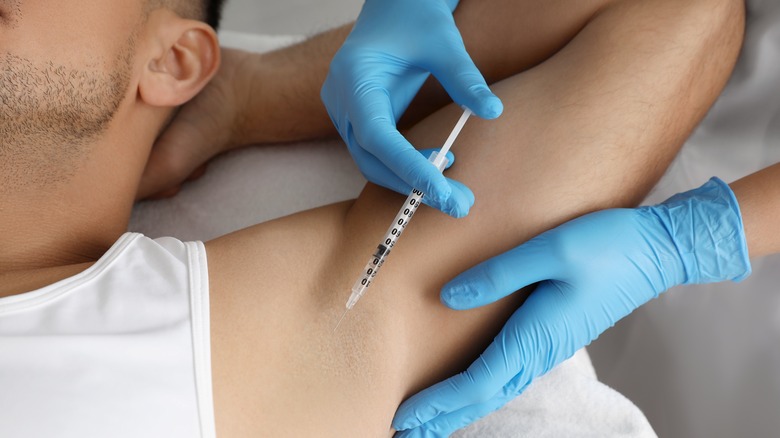How Botox Could Help Relieve Excessive Sweating
Dripping sweat in the middle of a warm day or yoga class is not exactly fun. But excessive sweating when you're not even warm or exercising can be embarrassing, upsetting, and anxiety-inducing. Could Botox injections — yes, Botox — help?
When functioning normally, nerves in your body send signals to the sweat glands telling them to release sweat, usually triggered by rising temperatures or physical activity, during a workout, for example, according to the Mayo Clinic. Excessive sweating, or hyperhidrosis, isn't necessarily the result of heat or exercise. Instead, the nerves become overactive and cause more sweating than usual. Stress or anxiety can make it worse. Typically the hands, feet, underarms, and face are affected the most. This can disrupt your normal routine and cause social withdrawal. Sometimes hyperhidrosis is caused by an underlying medical condition, but it can also run in families. It's estimated that 3% of Americans suffer from excessive sweating, according to the American Academy of Dermatology Association.
Can Botox really help?
Common treatments for hyperhidrosis include prescription-strength antiperspirants, prescription creams, oral medications, and even antidepressants (via Mayo Clinic). But Botox, which is usually known for smoothing wrinkles, is also useful for treating hyperhidrosis when it's concentrated in one part of the body (via M Health Fairview). It uses botulinum toxin to target the nerves responsible for excessive sweating, blocking the signals they send to the sweat glands. Treatment is needed every four to six months, but eventually, patients can go longer between injections.
Patients generally tolerate the injections well, making it a popular option for treating hyperhidrosis, according to Dr. Lori Fiessinger, a University of Michigan Health dermatologist. The underarms, hands, and feet in particular respond well to treatment, although injections in the hands and feet can be more painful. Results can be seen in as little as five days and up to two weeks. However, those who are pregnant, breastfeeding, or have a history of neuromuscular disorders shouldn't try it. If you suffer from excessive sweating, check with your doctor first to be sure it's not caused by a more serious medical condition.


